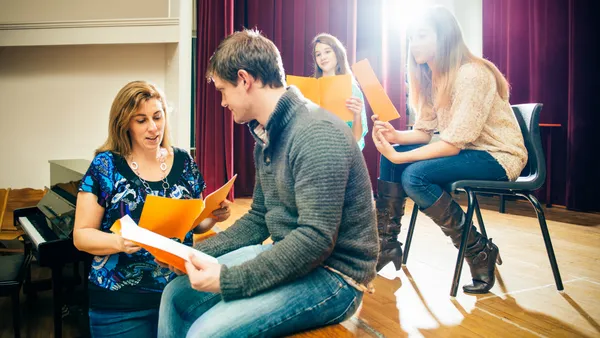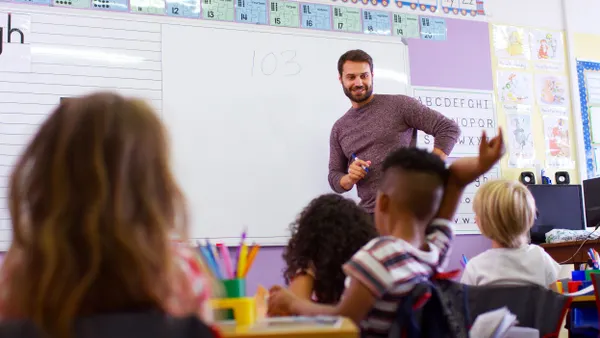New York City Department of Education Chancellor Carmen Fariña announced in December that she would retire in the coming months, pending the selection of her replacement, drawing to a close a tenure largely marked by accomplishments focused on expanding education access for all students in the nation's largest district.
Education Dive: K12 caught up with Fariña recently to discuss not only her accomplishments, but also what she wishes she had been able to do, as well as where she sees continuing opportunity, her experiences rising through the ranks as a woman, and advice for aspiring administrators.
EDUCATION DIVE: You've seen a lot of success on initiatives to expand access to computer science, literacy, algebra and pre-K. Which of your accomplishments overall would you say that you're most proud of?
CARMEN FARIÑA: Oh my goodness. You're asking me to choose which of my children I love the most. I think the fact that all the initiatives that we've put in place really encourage people to collaborate. Making sure that we have schools that are working together has been crucial.
I definitely think our early childhood initiatives are game-changers. We do 3-year-olds and 4-year-olds in many of our communities. Two or three years of school with more parent engagement and involvement is really going to make a difference.
And certainly, it's not just the high school graduation rate getting better, but the college-readiness rate is improving. That, to me, is a real point of pride. I think also that the gap, although it's not as good as I'd like it to be, is much better with black and Hispanic students. As someone who speaks another language, our dual-language programs are a point of honor.
If I could wave a magic wand, I would say everyone in New York City and the state should speak two languages, and we're pretty close to getting that kind of philosophy done here in New York. It's wonderful.
Also, from the very first year I started, [we've had] a major emphasis on middle schools. I really believe that 7th grade is the most important grade in the system. It's where the kids are the most vulnerable. And I think having put more guidance counselors and arts programs in our middle schools and after-school programs has been, really, part of it being a game-changer.
Everything is under equity and excellence. [We] make sure that our superintendents are well-trained. I meet with them every single month. So we're moving with one voice out into the community, and that's something that hasn't happened in the system in a very long time. I know that from all my prior jobs.
I'm proud of a lot of different things. Bringing respect and dignity back to both teaching and leadership is important. I was a teacher. I was a principal. And the thing that I'm proudest of when people talk to me is, "I know you know what we're thinking. I know you understand what we're doing." I think that's a really important message as a leader.
Were any of those initiatives more challenging than others to sell a lot of people on?
FARIÑA: I think all of them have their own particular challenge. Certainly with the 3-year-olds and the 4-year-olds, space is always going to be an issue. And also in many communities, parents not sure about sending their children to school all day. I think we've fully convinced them of that now.
I'm very fortunate to have a wonderful team that knows how to execute plans once we put them in place. And I think teachers have to be open to learning new materials and learning how to change things. I mean, all our programs, particularly all the professional development, require that teachers commit themselves to going back to school during the summer. We have teachers that agree to work for three weeks during the summer to learn the algebra for all, learn the computer science, the STEM programs.
I do think getting a community of teachers who are invested in their own learning was a challenge, but I think we really have managed to do that. I'm very proud of them. Actually, the last time I met you, we were getting an award for teacher recruitment and retention. To me, that is a point of pride, that people want to work in New York City. They like the professional development that we do. Having the extra 80 minutes per week, every week in every school, is a real game-changer for teachers as well as their principals.
Is there anything that you wish you had been able to accomplish that didn't happen or didn't pan out as well as you had hoped?
FARIÑA: I certainly think everything we've done, being able to do it wider but knowing full well that if you try to rush too fast into something, you don't get the kinks worked out. The sense of urgency that we brought to the table was really important.
We made decisions about what we were going to roll out faster. The students in temporary housing, that issue really loomed large. And it took us a while and we're still not fully there.
It's one thing to say a child's in temporary housing. It's another thing to say, "How do you get them from their temporary housing to the schools that they're enrolled in, which could be in another borough?"
How do we deal with busing? How do we train teachers, for example, to work with students who are traumatized? Many of our students in temporary housing are traumatized. When we put in programs such as extra guidance counselors in schools that have a certain percentage of kids that are homeless, how do we help teachers cope with that? And realizing also that in some of the schools with high trauma, teachers need support, like in restorative justice.
But the work with temporary housing — you're talking 100,000 children in New York City — is still ongoing. To me, the solution to that is going to be affordable housing, but that's out of my bailiwick.
And special education — we've made major, major strides in special education. But here again, there's more work to be done.
What do you see as the biggest challenge for New York City schools going forward? And also the biggest opportunity?
FARIÑA: I think the biggest opportunity is to make sure that, no matter what neighborhood or what zip code you live in, you're going to have the best teachers and the best principals.
That's part of our overall initiative. And, I think, also understanding that we have done a major effort — and successfully — in involving parents and communities in our schools.
We have done tremendous outreach to our community-based organizations. I have gone to a couple-hundred town hall meetings; knowing that parents and the communities are able to come out to a meeting and ask me questions on a personal level, I think, has been very important. And letting parents know that we value their input. Some of our good ideas have come from parent forums, and that's been a really important part of this.
I made it my business to really work closely with my city council members and even my state legislators. I don't think anyone can take this job and see it as a purely educational job. It's also about making sure everyone is onboard with you, to make sure that the changes you want to make are implemented, and that everyone understands that students must always come first. That means that everybody has to understand what you're doing and why you're doing it.
You had mentioned rising through the ranks from the classroom to the chancellorship. How important is it to have an educator at the helm of a school system, especially in situations where you're with policymakers who might not have that same sort of experience or background but who are making decisions that affect that?
FARIÑA: It's crucial. When I speak to parent audiences, I wear my former parent hat. My kids went through public schools in New York City. In fact, I was their 4th-grade teacher.
I know very much what a parent is thinking at any part. So when the parents ask a question, I don't roll my eyes or say, "Oh my god, this is not important." Because I know, for that parent, that is very, very important.
Parents feel that I understand where they're coming from. As a grandmother, I actually see and feel it twice as much, because I want my grandchildren to be in supportive classrooms. I want them to be taught, but I also want them to feel good about themselves and have self-confidence.
I think for me as an educator, also, I'm a big proponent of the arts. Bringing the arts back to New York City schools was crucial. So having the support of the cultural institutions of New York City for things that I want to do has meant that we have invested in almost every single school in the city to have more arts programming.
As a teacher, I had wonderful relationships with parents. But also, I knew how to share with my colleagues. It's important to know your curriculum. If anyone asks me how important is that for becoming a school leader, how do I ask teachers to improve their teaching if I haven't done it myself?
One of the fallacies is that if you're an educator, you can't be a CEO-type leader. And I think you can be all. I happen to like doing budgets. One of the departments that I really wanted to see some changes in is HR, and hiring someone who's going to look at HR from a positive point of view was very important to me.
I have a teacher advisory group that I meet with on a regular basis for them to tell me what's going on in their schools. I think the CEO also has to have political savvy. You need to know how to get elected officials to pass a budget that's favorable to you. I think that's all part of the job.
I think being an educator is very important, but I don't think that being an educator automatically assumes that you can't do the other parts of the job. Specifically if you're a woman.
Last year at SXSWedu, you mentioned that it wasn't common for there to be women in administrative roles early in your career. What are some of the challenges you faced as a woman while you were advancing throughout your career?
FARIÑA: To some degree, there was always an assumption that there were just certain things you didn't know as well as a man. And I remember being told, "Don't worry about this. You don't have to worry about the budget. Someone else can do that for you." I happen to find that offensive.
I remember as a principal, my custodian thinking that I shouldn't have the keys to the building because it would be "dangerous" for me to use the keys if there was no one in the building. He wouldn't even share the building code to get into the building. I found that offensive. In fact, he actually said to my husband, "If she's coming in on a Saturday, make sure you come with her." Why? This is not the kind of thing that I think a lot of women have to go through today, but I'm still sure in parts of the world, there is still some of that.
I think also the notion that, as a woman, you have to make excuses for making certain decisions. For example, you have a sick child at home. Well, that should be one of your priorities as long as you do everything else, and people should understand it. A man would probably lie before he would admit to that.
The reality is, we are human beings first, and we should have social-emotional intelligence to be able to make a lot of decisions. Assuming that because you're making a decision based on your social and emotional versus something else doesn't make you less of a leader. And I think that's really important.
I was a teacher when the first female high school principal was appointed in New York City. I was also at a meeting, when I was already a curriculum developer, when it was okay to say publicly, "We don't want a female principal in this school at this time." And the school board voted for a male principal over a woman who was much more qualified.
It isn't like these are abstract stories to me. I've lived them. I've seen it. I consider myself probably the first one-and-a-half female chancellor in New York City. And there was an assumption in the beginning, "Well, she's going to be really different because she's a woman."
I don't think it's different. I just think it's a matter of being able to multitask. And the multitasking is based on social-emotional intelligence.
You also mentioned the benefits of speaking Spanish. How did that boost and influence your leadership in New York City?
FARIÑA: I think it was absolutely something that was enhanced a hundred times more than I expected. When I go into an audience and I do my own translations or I speak to a parent in Spanish, I cannot tell you how many of them either hug me, kiss me or cry.
I had a man stop me in the middle of Columbus Avenue the other day with his phone and say, "Can I take a picture of you?" All in Spanish. "I want my daughter to know that she can grow up to be like you." The honors I've gotten from the Spanish Federations in New York City have been amazing.
It's, to me, the pride they have — "If you can do it, then our kids can do it. We can accomplish it."
Having parents accept you for that other part of your personality is very, very important. I wish I could speak more languages, to be honest with you. There's a certain sense of community that you get when you speak to people in their own language, which is why we've also pushed for more translations, for more dual language. We have Urdu as a dual language. We have Bengali. Respect the people who are in your particular schools, and they'll respect you back.
What advice would you give educators who are aspiring to reach the administrative level?
FARIÑA: I would say, first and foremost, become a good head of a curriculum. Make sure that you know one curriculum very well. Whether it's literacy or math or science, be knowledgeable in the field, because a lot of the strategies translate from one subject area to the other.
But be sure ... you keep updated, that you go back and you learn more. I still take courses now. I think that being a learner and demonstrating that you're a learner is crucial to people in the field.
I think also build on outside elements. One of the things that's helped me in this job ... is how many networks I belong to outside of education. I have always been very involved with cultural institutions. Many of the leaders of the cultural institutions knew me from way back. They were the first ones to step up and say, "What can we do to help your job, chancellor?"
Be involved with your family in ways that matter, because a lot of the stories that I tell about things with my family help make the job more human. So for people who want to be leaders, start by being a leader in your own building.
If you're a teacher and you keep your door closed and you don't share with other teachers what you're doing, ultimately that's not going to help you. [When I was a teacher] I offered assistance to any new teacher in the building to come in and watch me teach. I also went to other teachers who I knew were better than me at something and watched them teach.
How you demonstrate what kind of learner you are is also going to be what kind of a leader you're going to be. And [you need to] have a lot of networks in your life that you can then bring to the table. I would never have become a chancellor if I didn't think that I had enough people to bring to positions to assist me who I had worked with over time.












